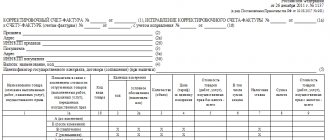What determines the adjustment of financial statements?
Regulates the procedure for correcting errors made in the reporting forms of PBU 22/2010, and it varies depending on the type of error and the time of its discovery.
An important criterion influencing the need to adjust the annual financial statements is the degree of materiality of the error, which is established by the company. In this case, the magnitude and nature of the error, as well as the size of the distortion of balance sheet items that followed it, are taken into account.
The procedure for determining the significance of errors is fixed in the accounting policy. Such errors must be corrected. The non-essential ones, i.e. those that do not fall within the established standards are corrected in the current period; their identification does not entail an adjustment to the accounting statements.
Based on the time factor, the gradation of errors as detected is determined:
- In the reporting period until the end of the year (eliminates by correctional entries in the month of detection in the reporting year);
- During the reporting period until it is signed by the chief accountant and general director (eliminates by corrective entries for December of the reporting year);
- After signing and submitting the reports to the Federal Tax Service, but before submitting them to the owners of the company. In such a situation, adjustments to the financial statements for the previous period are necessary. They do it like this:
– correctional entries were made in December last year;
– calculate the financial result;
– generate an updated version of reporting;
- they hand it over to the Federal Tax Service.
- After presentation to the owners, but before their approval of the statements. For example, at a general meeting some inaccuracies are discovered. And in this case, the reporting should be updated according to the above algorithm, adding in the explanation the reasons for the revision;
- After approval by the owners. Adjustment of financial statements after approval is impossible, and the identified error is corrected in the current period in which it was identified.
So, you can correct the information presented in the annual reports after submitting it to the Federal Tax Service and Rosstat in the period before approval by the business owners. Submission of reports not approved by the owners to tax authorities is an ordinary event, since the deadline for submitting reports to the Federal Tax Service expires on March 31, and the period for approving reports in an LLC lasts from March to April, and in a JSC from March to June inclusive. Thus, adjustments to financial statements after submission to the tax office can be carried out for as long as the business owners have not approved them.
Balance sheet: how and when
An accounting report is a reflection of the enterprise’s activities as of the reporting date. Properly compiled, it can be useful not only to the tax authority, but also to the manager or owners of the enterprise. Therefore, you should pay special attention to how the balance sheet is formed and how it is surrendered.
The composition of the reporting and the rules for its completion are regulated by the federal law “On Accounting”. But when the balance is handed over is stated in Article 23 of the Tax Code of the Russian Federation.
Who hands over the balance
Which organizations hand over the balance sheet is stated in Law 402-FZ of December 6, 2011. Now all economic entities are required to provide financial statements, with the exception of some individual entrepreneurs who keep records of income and expenses. Also in this law there is a clause about which organizations may not hand over the balance. This applies to branches of enterprises established on the territory of foreign countries.
Composition of financial statements
Which reporting forms will need to be submitted depends on whether the enterprise is commercial, budget-funded, or whether it is a small business entity (SMB).
A commercial organization submits the following package of reporting forms:
- Balance sheet;
- Income statement;
- Attachments (statement of changes in equity, statement of cash flows and an appendix with a breakdown of the main lines of the balance sheet and income statement).
SMEs that are not subject to mandatory audit criteria have the right to provide simplified financial statements. It is distinguished by aggregated indicators grouped by articles and the absence of detailed transcripts. It is necessary to understand that this opportunity exists regardless of the taxation system.
That is, both organizations using the simplified tax system may be required to submit basic detailed forms, and enterprises using the simplified tax system may provide simplified reporting. In addition, those who submit a balance sheet should remember that providing it in a simplified form is a right, not an obligation.
And if necessary, you can always submit the main report.
For non-profit enterprises, the reporting includes a report on the intended use of funds instead of a report on financial results.
Advice: Every year before submitting the balance sheet, you should check whether the reporting forms have changed.
The form of the accounting report and appendices was approved by Order of the Ministry of Finance 66n dated 07/02/2010 and when writing the accounting policy, it can be supplemented, if necessary, with any number of lines, but it is not allowed to exclude any information from the established forms. When finalizing the form of the document, we must not forget that the financial statements must be:
- Reliable;
- Informative for users of the report in order to make economic decisions based on the data obtained;
- Compiled on the basis of data from accounting registers.
Remembering that the balance sheet is not only a report for regulatory authorities, but also an opportunity to check the state of accounting and assess the economic stability of the enterprise, drawing up such a document no longer seems like a burden.
How to submit an accounting adjustment. reporting
Since the legislation regulating accounting operations does not provide for the submission of adjustment reports, clarifying options are submitted by redoing the previous reporting forms and submitting them on paper. In machine-readable forms submitted to the Federal Tax Service, the adjustment number in the financial statements is changed. In the “Adjustment No.” field provided, enter its number – 1—, 2—, etc.
The grounds that led to the revision of the statements must be set out in an explanatory note, and the entire package of newly submitted statements is accompanied by a letter explaining the reasons for submitting the clarification and emphasizing the significance of the corrections made. Reporting adjustments must be submitted to all regulatory authorities where the primary information was submitted.
If an error is identified, it would be useful to notify the Federal Tax Service in writing about the upcoming changes, indicating specific corrections. This is important, since tax authorities compare tax and accounting data, and discrepancies in them, which are considered gross, can lead to penalties for officials. Art. 15.11 of the Code of Administrative Offenses of the Russian Federation provides for fines from 5 to 10 thousand rubles, and if the situation repeats - from 10 to 20 thousand rubles. Distortions of any accounting indicator or understatement of taxes in the amount of 10% of the amount of the corresponding indicator can be considered gross.
Significant and immaterial errors in reporting
Important! All corrections take place only if the error made in the reporting is significant.
If there was a minor inaccuracy (blot) in the report, then regardless of when it was discovered, corrections are made in the current period. In this case, the reporting (last) year is touched and adjustment reports are not required. Thus, if minor errors are discovered in the reporting, adjustments cannot be provided. All corrections are made only in case of significant errors.
A significant error is an error that, alone or together with other indicators, can lead to a distortion of the company’s financial position, as well as to the adoption of incorrect management decisions.
The procedure for determining the materiality and insignificance of errors will be determined by the companies independently. Moreover, this should be enshrined in the company’s accounting policies. This can be done in the following way: indicate in the accounting policy that “an error is considered significant if its value distorts the report indicators by more than 10%.”
Example: adjustment of financial statements for 2021
On April 10, 2021, after submitting the financial statements of Luch LLC to the Federal Tax Service, an inaccuracy was identified in the calculation of due dividends. The misstatement amounted to 11% of the true amount of accrued payments. Since the company’s financial statements have not yet been approved by the owners, but have already been submitted to the Federal Tax Service and statistical authorities, adjustments are necessary to normalize the accounting statements.
The accountant will have to inform the Federal Tax Service as a matter of urgency:
- Make corrective entries, dating them to December 31, 2017;
- Recalculate the results of work for the year;
- Prepare a new version of financial statements;
- Submit to all regulatory authorities with the necessary written support about the changes made.
How to prepare and submit an adjustment balance sheet to the tax authorities
So, the obligation to timely prepare and submit financial statements to the Federal Tax Service is assigned to all economic entities. This rule is stated in paragraphs. 5 p. 1 art. 23 Tax Code of the Russian Federation. Consequently, all organizations, both Russian and some foreign representative offices, as well as certain categories of entrepreneurs, are required to submit a balance sheet and appendices to it to the inspectorate.
We talked about the composition of the reporting that is required to be submitted to the Federal Tax Service in a separate article “Forms of accounting reports”. Let us recall that some economic entities have the right to maintain simplified accounting. It is these categories of taxpayers who report in a simplified format. Read more about this in the material “Simplified accounting financial statements”.
To fix or not
The procedure and rules for compiling accounting reports are established not by fiscal, but by accounting legislation. Moreover, current standards do not allow the making of corrective entries into already approved statements. Therefore, if the owner has already approved the finished balance sheet, then corrections cannot be made to the form. This means that you won’t have to send the adjustment balance to the tax office.
Also, the need to provide correction records is determined by the nature of the error found. The submitted forms will have to be corrected if significant errors are found in the accounting.
Let us recall that significant errors are those that, individually or in combination with other economic indicators, can affect the economic decisions made by the owner based on the analysis of reporting data. In simple terms, these are the errors that significantly distort the real results and performance indicators of the institution. However, the level of materiality for each organization should be fixed in the accounting policy.
Conclusion: adjustments can be submitted to the Federal Tax Service only using unapproved reporting forms and if significant errors are identified in accounting. Otherwise, this is a direct violation of accounting legislation.
Adjustment of simplified financial statements
Other rules apply to the reporting of small enterprises, incl. companies on the simplified tax system. Regardless of whether the detected error in the reporting forms is significant or not, adjustments to the financial statements are not provided, since simplifiers are given the right to recognize all errors found in the reporting as insignificant and correct them in the period in which they are discovered. Thus, the simplifiers do not adjust the reporting, but, of course, the obligation to correct errors in accounting remains.
Accounting forms and the procedure for their approval
Each Russian organization must no later than 31.03. provide the authorized bodies with a package of accounting documents. Today, the set consists of five reporting forms, each of which carries a specific meaning.
It is a priori assumed that these forms are drawn up taking into account all current requirements of domestic legislation and reflect the real state of affairs in the company. However, in practice, situations increasingly arise when documents already submitted to the Federal Tax Service and Rosstat contain incorrect information, and therefore companies need to submit updated information. Is it possible to submit an adjustment to the annual financial statements? To answer this question, let’s consider how it is formed and who exactly is responsible for the correctness of the documents.
The question of how to submit adjustments to financial statements will be discussed below.
In accordance with general requirements, the chief accountant of the company is responsible for drawing up a package of accounting documents. In turn, its general director is responsible for signing the reporting documentation.
Limited liability companies and joint stock companies are characterized not only by the preparation of reports, but also by their approval by the board of directors. At the same time, depending on the organizational and legal form of the company, different deadlines for approval of documentation are established.
LLC, represented by its founders, should approve its accounting records no later than April of the year following the reporting year. Whereas in joint stock companies the deadline for approval of reporting by shareholders has been extended until June.
Thus, at the time of submission of reporting forms to the Federal Tax Service and Rosstat, these documents do not receive approval from the management of the organization.
Adjustment of calculation of insurance premiums
Correcting errors in tax accounting
If the provisions of PBU 22/2010 are relevant for legal entities, since the self-employed population is not required to keep accounting records, then the procedure for correcting errors in tax accounting applies to both entrepreneurs and organizations.
According to Art. 314 of the Tax Code of the Russian Federation, errors in tax registers must be corrected using a corrective method: there must be a signature of the person who corrected the register, the date and justification for the correction.
The procedure for correcting errors in tax accounting is described in detail in Art. 54 Tax Code of the Russian Federation.
If an error in calculating the tax base for previous years was discovered in the current reporting period, then it is necessary to recalculate the tax base and the amount of tax for the period the error was committed.
If it is impossible to determine the period of the error, then the recalculation is made in the reporting period in which the error was found.
Errors in tax accounting, as a result of which the tax base was underestimated, and therefore the tax was underpaid to the budget, must not only be corrected, but also an update provided to the Federal Tax Service for the period the error was committed (Article 81 of the Tax Code of the Russian Federation). However, if an error is discovered during a tax audit, then there is no need to submit an amendment. In this case, the amount of arrears or overpayments will be recorded in the audit materials, and the tax authorities will enter this data into the company’s personal account card. If the company submits a clarification to the tax authority, the data on the card will be doubled.
In the case where a company overpaid tax due to its own error, it may submit an amendment or not correct the error (for example, the amount of overpayment is insignificant). Another option that a company can use is to reduce the tax base in the period the error is discovered by the amount of overstatement of the tax base in the previous period. This can be done when calculating transport tax, mineral extraction tax, simplified tax system and income tax.
ATTENTION! This method cannot be used when identifying errors in VAT calculations, since inflated VAT can only be corrected by submitting an amendment for the period the error was committed.
If a company operated at a loss and identified an error in the previous period that would increase the loss, then these expenses cannot be included in the tax calculation for the current period. The company should submit an update with new amounts of expenses and losses (letter of the Ministry of Finance dated April 23, 2010 No. 03-02-07/1-188).
How to correct mistakes made
The first option should be considered in more detail:
- The inaccuracy was made this year. In this case, it is enough to simply make the required entry at the time the error is detected;
- The inaccuracy was made in the previous year, but the accounts for this period have not yet been signed by management. In this case, the correction must be made by dating it to the last day of the previous year (December 31).
Important: Regardless of the situation, you simply need to remove the inaccurate entry and make the correct note.









